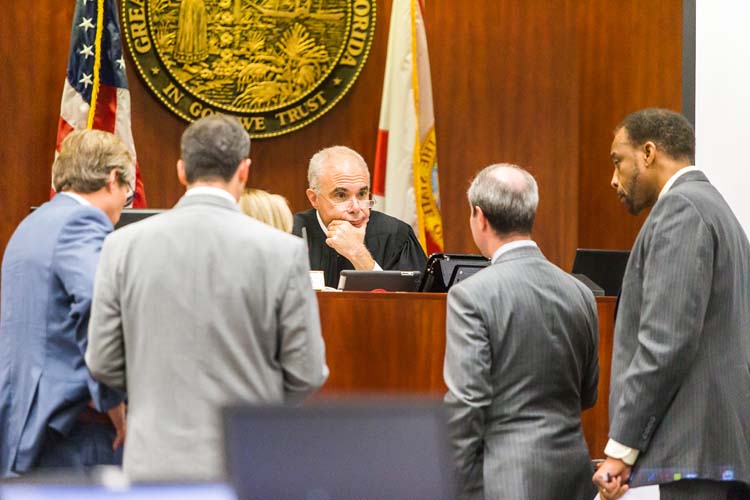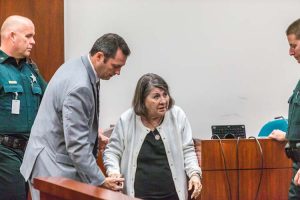
After spending weeks hearing testimony in a downtown Vero Beach courtroom, an Indian River County jury took just hours to find no fault on the part of cigarette maker R.J. Reynolds in the lung cancer death of a local resident.
Six jurors deliberated behind closed doors Aug. 23, concluding that Demos Jones was not addicted to the nicotine in R.J. Reynolds’ cigarettes, and therefore his addiction was not the legal cause of his lung cancer and death.
This prevented the jury from awarding any or all of the $12.5 million in damages sought by the Jones family.
Lawyers for the widow and his son motioned for a mistrial.

Plaintiff Phyllis Jones is helped from the stand during a trial in Vero Beach on August, 18, 2017.
“We believe in our system of justice and have great respect for the sacrifices this jury made in considering this case,” said David Carter, who represented the family alongside his co-counsel, Jason Odom.
Carter and Odom are both attorneys with the island law firm of Gould Cooksey Fennell.
“We know they did their best, but they could only base their decision on the evidence and arguments presented to them,” Carter said.
“There were many examples of arguments and commentary on the evidence which we believe to be clearly improper.”
While Carter focused much of his attention in the courtroom on what the tobacco companies did and did not disclose about the health risks of cigarettes, lawyers for R.J. Reynolds questioned the financial motives of the family and expert witnesses called to testify.
They didn’t dispute that Jones was a heavy smoker, that they hid the health risks of cigarettes, or that smoking can cause health conditions like lung cancer.
They argued instead that Jones understood the risk he was taking, even at a young age.
Jones called his cigarettes “coffin nails” as a teenager.
He also was able to refrain from smoking in certain situations, like when he was inside of the high school, or when he was going to visit his girlfriend at her parent’s house, R.J. Reynolds’ attorney, Jose Isasi II, argued in court.
Jones further went on to successful careers in banking, leisure and the hospitality industry, he said.
Even the family of the former golf professional believed he could do anything he put his mind to. Why, then, didn’t Jones try harder to quit smoking, the lawyer for the tobacco company asked.
Jones was educated and well read, he said. He undoubtedly saw news reports about the risk.
Yet, he didn’t go to tobacco cessation clinics or to smoking support groups, which were rising in popularity at the time, Isasi said. He only tried to quit twice.
“If you’ve ever had the experience of maybe having a little too much to drink one night and you wake up in the morning and you’re not feeling well, and you look at yourself in the mirror, do you ever say to yourself, I feel 3 percent responsible for that hangover that I’ve got?” the lawyer asked the jury as he discussed the prospect of awarding damages.
“Who’s looking back at you in the mirror?
“It’s not Jack Daniel’s. It’s you. Those are the choices that you made.”
“We were forced to move for mistrial multiple times over the course of the trial, and we think the law will ultimately mandate a new trial,” Carter said after the verdict.
A spokesperson for R.J. Reynolds did not respond to a request for comment.
Jones, born in 1931, started smoking in the mid-1940s between the ages of 14 and 16.
His wife, Phyllis Jones, cried on the stand as she discussed the months leading up to his death in 1995. The two met in high school.
Jones sometimes smoked as much as two packs a day, lighting a cigarette first thing every morning.
“I’m asking for justice, not sympathy,” Carter told the jurors in closing arguments.
Carter reminded the jury that R.J. Reynolds intentionally concealed the health risks of smoking in its marketing efforts.
They targeted kids, he said. This formed the world Jones grew up in. “This is what was happening to lay the groundwork.”
Gould Cooksey Fennell also served as co-counsel in a 2015 lawsuit, Gloria Gore versus R.J. Reynolds and Philip Morris.
In that case, $2 million in damages was awarded to the plaintiff.
Thousands of similar cases have been filed in the state of Florida in the wake of a 2006 state Supreme Court ruling that such lawsuits must be heard individually instead of as a class action.
Arguments made by plaintiffs and their attorneys in the so-called “Engle progeny” cases are boosted by the high court’s findings that smoking causes certain diseases and that tobacco companies hid its dangers.



